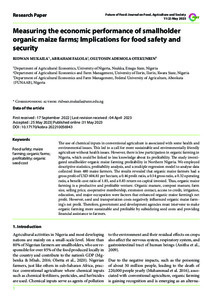| dc.date.accessioned | 2023-06-28T12:16:17Z | |
| dc.date.available | 2023-06-28T12:16:17Z | |
| dc.date.issued | 2023-05-31 | |
| dc.identifier | doi:10.17170/kobra-202210056943 | |
| dc.identifier.uri | http://hdl.handle.net/123456789/14853 | |
| dc.language.iso | eng | |
| dc.rights | Namensnennung 4.0 International | * |
| dc.rights.uri | http://creativecommons.org/licenses/by/4.0/ | * |
| dc.subject | food safety | eng |
| dc.subject | maize farming | eng |
| dc.subject | organic farms | eng |
| dc.subject | profitability | eng |
| dc.subject | organic seed cost | eng |
| dc.subject.ddc | 630 | |
| dc.title | Measuring the economic performance of smallholder organic maize farms; Implications for food safety and security | eng |
| dc.type | Aufsatz | |
| dcterms.abstract | The use of chemical inputs in conventional agriculture is associated with some health and environmental issues. This led to a call for more sustainable and environmentally friendly agriculture with no health issues. However, there is low participation in organic farming in Nigeria, which could be linked to less knowledge about its profitability. The study investigated smallholder organic maize farming profitability in Northern Nigeria. We employed descriptive statistics, profitability analysis, and a multiple regression model to analyse data collected from 480 maize farmers. The results revealed that organic maize farmers had a gross profit of USD 604.81 per hectare, a 0.46 profit ratio, a 0.54 gross ratio, a 0.32 operating ratio, a benefit-cost ratio of 1.85, and a 0.85 return on capital invested. Thus, organic maize farming is a productive and profitable venture. Organic manure, compost manure, farm size, selling price, cooperative membership, extension contact, access to credit, irrigation, education, and major occupation were factors that enhanced organic maize farming net profit. However, seed and transportation costs negatively influenced organic maize farming's net profit. Therefore, government and development agencies must intervene to make organic farming more sustainable and profitable by subsidizing seed costs and providing financial assistance to farmers. | eng |
| dcterms.accessRights | open access | |
| dcterms.creator | Mukaila, Ridwan | |
| dcterms.creator | Falola, Abraham | |
| dcterms.creator | Otekunrin, Olutosin Ademola | |
| dcterms.extent | 12 Seiten | |
| dc.subject.swd | Nigeria | ger |
| dc.subject.swd | Maisanbau | ger |
| dc.subject.swd | Lebensmittelsicherheit | ger |
| dc.subject.swd | Rentabilität | ger |
| dc.subject.swd | Saatgut | ger |
| dc.subject.swd | Biologische Landwirtschaft | ger |
| dc.type.version | publishedVersion | |
| dcterms.source.identifier | eissn:2197-411X | |
| dcterms.source.issue | No. 2 | |
| dcterms.source.journal | Future of Food: Journal on Food, Agriculture & Society | eng |
| dcterms.source.volume | Vol. 11 | |
| kup.iskup | false | |
| dcterms.source.articlenumber | 609 | |


